Good Vision Not a Sign of Healthy Eyes
30 March 2020
851 views
We sat with Dr Tarek to understand how important it is to take care of our eyes, understand various eye issues, especially when we hit our 40's and the different treatments available to patients. Dr Tarek Ibrahim is a Consultant Ophthalmology and Head of Cornea and Refractive Surgery at Eye Consultants, Dubai Healthcare City.
How has Cornea Transplantation progressed?
Cornea is the entrance of the eye. There is a lot of advancement in cornea transplantation and diseases. In the past, it was very primitive. But right now, you can transplant one and each of the corneal layers depending on the disease. The objective is to tackle and treat only the area where the disease is. and this is a big big advancement.
How do you classify Keratoconus in patients?
We are seeing it here in this area, being in the gulf area, a lot of Keratoconus, which is the weakness in the corneal tissue. There is a genetic factor in Keratoconus. But the genetic factor is recessive, so you need to combine the father and the mother together to get this disease. Instead of leaving the patients waiting for Keratoplasty, for corneal transplantation, we can now stop it, we can now correct the vision based on the new technologies.
How do you classify patients needing LASIK or related surgeries like Lasik?
We have every type of error, every type of problem we have a solution for them, so Lasik is not the only solution. We have Lasik, Ultra Lasik, Femto Lasik, all these can correct the type of error that is below 8 degrees. So, if someone who has Myopia and it's either simple or moderate Myopia, definitely we can correct them by Laser. But there are also corrections for patients that have higher degrees of Myopia or hypermetropia, farsighted or nearsighted to make it simple. So, suppose a patient that has -14 or -15, definitely the LASIK or the ultra LASIK will not be the solution, but we can also implant a lens exactly as the contact lens, but instead of the patient having to put the lens in and take it out every day, with all the side effects that can happen in the eye, we bring a customized lens. There are a couple of them in the market but we do prefer something called ICL (Implantable Contact lens). It is a contact lens but implantable inside the eye. We just inject them behind the cornea and it stays there forever and gives patients better vision than the vision with the contact lens.
How durable are Implantable Contact Lenses (ICL)?
These lenses have many advantages, first it's an addition to the eyes so you don't take anything from the eye. You just add this to the optical system of the eye, which purifies the image to a very high degree. The second benefit is that it's reversible definitely, you can remove it through a specialist in this lens. Third, the more you go there's a golden rule, the more you go near to the eye, the more the quality of the vision, or the higher the quality of vision. Because we know vision has quantity and quality. Quantity that I can see things, but quality, if I can see these things clear. So, this lens has a very high quality of vision. Being inside the eye and nearer to the eye than the glasses and the contact lens.
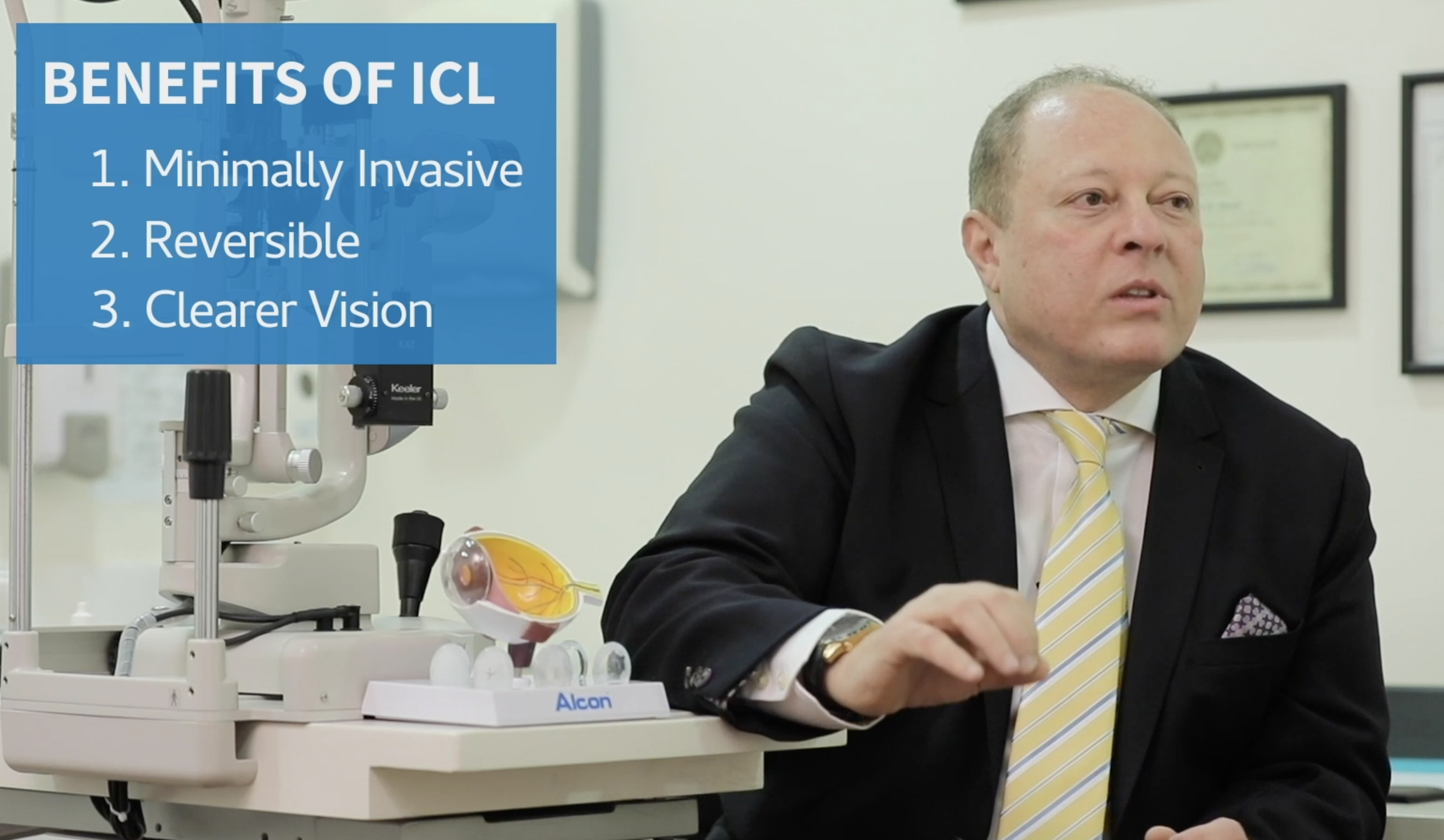
Does cataract require refractive surgery?
Nowadays, we consider cataract as refractive surgery. Cataract is when the lens (of the eye) becomes opaque. This lens should be crystal clear like glass. In the past, what we were doing, we were going inside the eye with a machine taking out this opacity and implanting a lens. Nowadays, with the advancements in nanotechnology, this brings cataract surgery to become a refractive surgery. What does this mean? This means the patient can be glass free in the removal of the cataract.
What's your perspective about Glaucoma?
Glaucoma means the increase in intraocular pressure and is more production from cells in the eye or decrease in going out of these cells; of these fluids. Now, there are a lot of advances in Glaucoma. In the past, we were helpless, so what were we doing, we were cutting open the eye to make the fluid come out. Nowadays there is no cutting. You leave the cutting of the eye for the late stages. You need to assess the Cornea, you need to assess the retina, you need to assess the nerve and then go from there.

How often should you visit the Ophthalmologist?
Prevention is better than cure so if you diagnose early you can treat early and then you will not get into complications and side effects. So, there is a golden rule that at 40 years old, I am talking about glaucoma, diabetes, and cataracts. At 40 years old, there should be a base-line assessment, even if you don't feel anything. Even if your vision is good and you are healthy in every aspect, you still need to see your ophthalmologist when you are 40 and based on what you can see there, you will be told. But, let me tell you if you cannot see any issues. So every five years, starting at 40, then every five years until you are 60 and then every year after that. This is the normal standard. If you see something, if you are diabetic type 2 or type 1, glaucomatous or cataractous, cataract you need to replace your lens but if you want to follow yourself up and you are 40, then it will be yearly. If you are diagnosed with glaucoma and then after 60 years old, every 6 months. So, prevention is better than cure and this is very important.
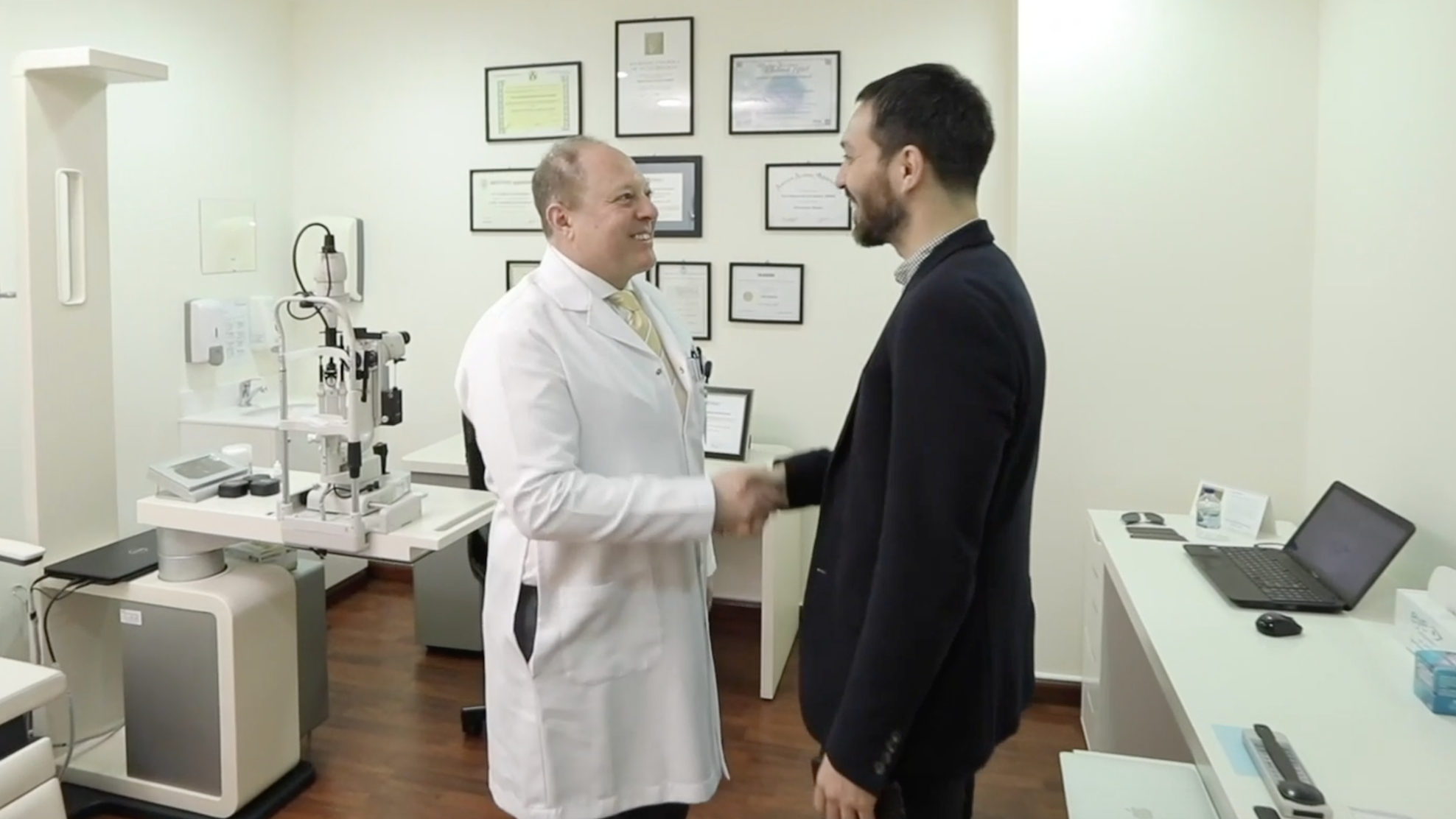
What's your advice to patients?
Some patients are thinking that they are having a big problem. They are coming depressed, saying: “I went to this doctor, I went here, I went there and I think I am not going to be cured and everything”. Because you are not going to the specialist and this is the main thing. If I want to build a wall I cannot get the things and do it myself, it will not come standard, so I am always telling patients don't worry just go to the person who is specialized in your disease, get your standard tests done and everything is solvable. The eye is an organ, it cannot work except if you are living a healthy life. Unhealthy life will definitely affect you, as it affects your heart, affects your digestive system, it will affect your eye. If you, from a young age, go by a healthy way of living: good sleep, less anxiety, eating healthy food, this will definitely affect you. Patients do not think that the eye will react to this but definitely, it will react because the eye needs vitamins and healthy food.
Comments
Other Articles
- The Best Prevention for Skin Aging is Education - 13 October 2020
- Learnings from the Frontline - 22 June 2020
- Can COVID-19 Affect New Born Babies? - 14 June 2020
- Traditional Indian Methods to Boost Your Immune System during COVID-19 - 11 June 2020
- Why Sudden Headache, Neck & Lower Back or Foot Pain While Working from Home? - 09 June 2020
- Does wearing mask mean death sentence for cosmetic dentistry? - 03 June 2020
- Aerosols are dangerous. Shall I delay dental treatments? - 03 June 2020
- Does COVID-19 mean no more braces with DIY Dentistry? - 01 June 2020
- Parents in Pandemic: How to Help Children Embrace the New Normal? - 29 May 2020
- Is it Safe to visit Dental Clinics during COVID-19? - 27 May 2020
- Skin Trouble After Wearing Face Masks? - 26 May 2020
- Parents in pandemic: how to keep children healthy and happy - 21 May 2020
- Severe Tooth Pain in the Middle of the Lockdown? - 20 May 2020
- Kids are very good COVID-19 carriers - 19 May 2020
- How pregnant women can boost their immune system during COVID-19 - 15 May 2020
- WORK FROM HOME? Beware of these Bone and Muscle Issues - 13 May 2020
- What happens to my braces? Orthodontic treatments during COVID-19 - 12 May 2020
- You can get Coronavirus through Eyes! Says Dubai Eye Doctor - 11 May 2020
- COVID-19, Perfect Time to Start IVF Treatment? - 10 May 2020
- A Psychiatrist's Advice to UAE Moms During COVID-19 - 07 May 2020
- Dubai OBGYN explains Infertility Procedures during Covid-19 - 04 May 2020
- COVID-19 and Pregnancy in Dubai - 19 April 2020
- The Complete Guide for the Best Dental Implants in Dubai - 14 October 2019
- The A to Z of Braces and Aligners - 10 October 2019
- Why Teeth Brushing at Home is Not Enough? - 09 October 2019
- Everything You Need to Know About Veneers - 02 October 2019
- What Happens If You Neglect Gum Bleeding? - 26 September 2019
- Children Will Never Forgive You for the Toothache - 05 September 2019
- How Dental Implant Surgery can be Pain-free - 03 September 2019
- This Doctor May Solve Your Chronic Headaches - 18 August 2019
- Meet Dr Madhu Matthews at Mankhool Dental Clinic - 07 July 2019
- 5 Ways to Keep Your Skin Healthy in the Middle East - 16 April 2019
- A German Pediatrician’s Recipe for Healthier Children in Dubai - 03 April 2019
- The Right Moment to Consider Plastic Surgery - 03 April 2019
- Obesity is a Disease - 31 March 2019
- South Asians in Dubai Suffer the Most from Heart Disease - 10 March 2019
- Best Braces to Choose: Damon system or Invisalign - 09 March 2019
- Korean Dermatologist Debunks UAE Tap Water Myth - 14 February 2019
- Interview: A Surgeon’s Simple Approach to Complex Surgery - 03 February 2019
- Interview: A Dentist's Playlist for Beautiful Teeth - 23 January 2019
- Interview: This Chairman of a Medical Group Pioneered Keyhole Surgery in the UAE - 08 January 2019
- Interview: Husbands Are Unknowingly Making a Pregnancy Riskier - 07 January 2019
- Interview: How to Make Orthodontic Treatments Affordable? - 20 December 2018
- Interview: Psychiatric Approach to Happiness in Dubai - 20 December 2018
- Interview: The Psychology of Identity Loss in Dubai - 17 December 2018
- Interview: A Humanitarian Approach to Plastic Surgery - 16 December 2018
- Interview: Treat Infertility like Solving a Puzzle - 10 December 2018
- Interview: Dubai's Only Comedian Dentist - 10 December 2018
- Interview: A Holistic Approach to Gynecology in Dubai - 27 November 2018
- Interview: Treat Pain without Surgery - 26 November 2018
- Interview: Best Surgeon in Dubai 2017 - 22 November 2018
- Interview: UAE's Only Female Vascular Surgeon - 28 May 2017
Related Articles
The Best Prevention for Skin Aging is Education
Meet Dr Olga Islomova, a senior beauty and laser aesthetician.
13 October 2020
Learnings from the Frontline
Dr Anil shares his fear, challenges, and learnings as COVID-19 task force leader at a Dubai ...
22 June 2020
Can COVID-19 Affect New Born Babies?
Dr Sridhar shares his first-hand experience on the effect of Coronavirus to new born babies
14 June 2020
Ask Doctors in Dubai
Thank You
Login
Login
Forgot Password?
Register Now
Edit Topic
Edit Comment
Edit Review
Profile Image
Loading...
Please wait...



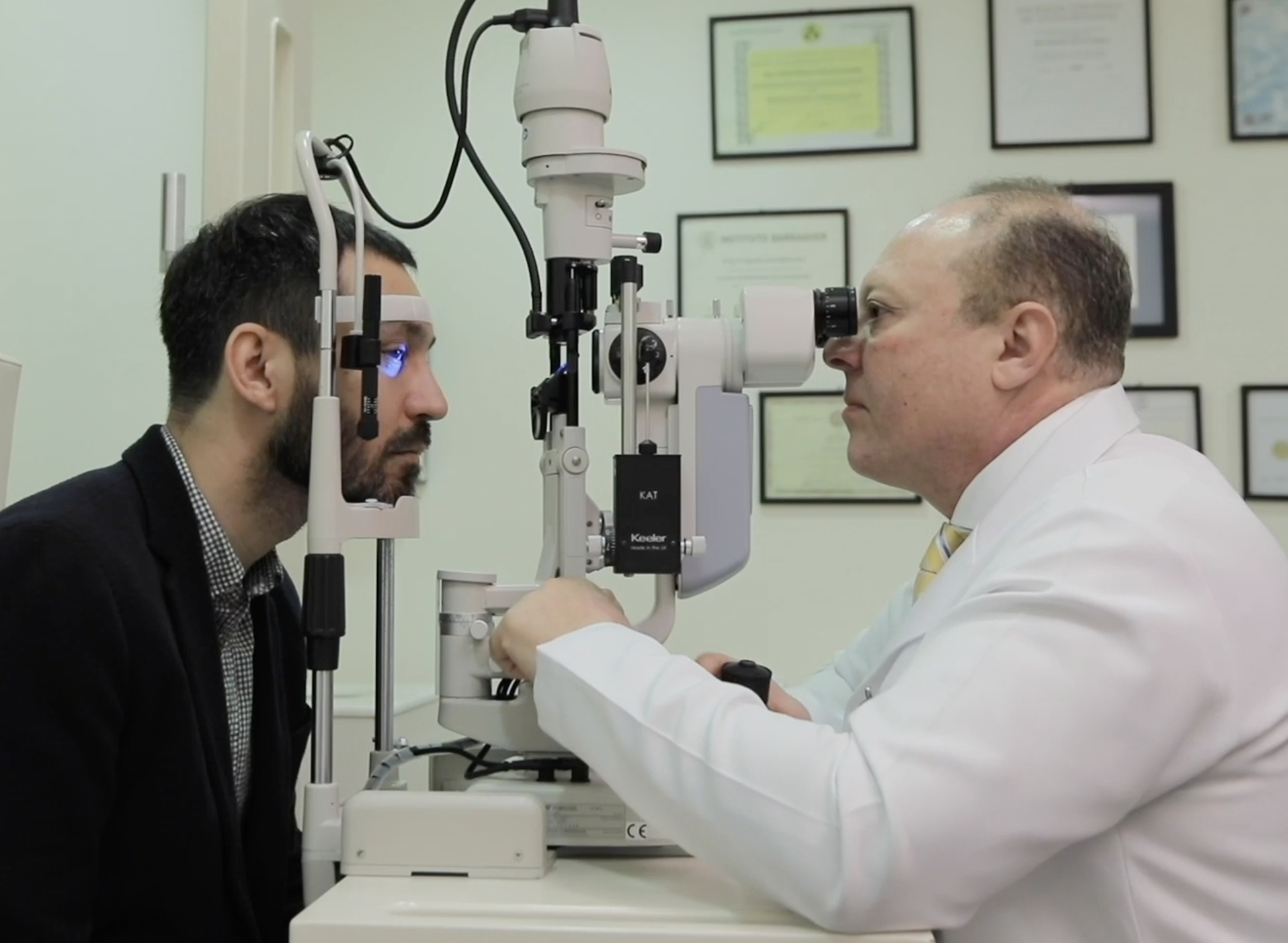

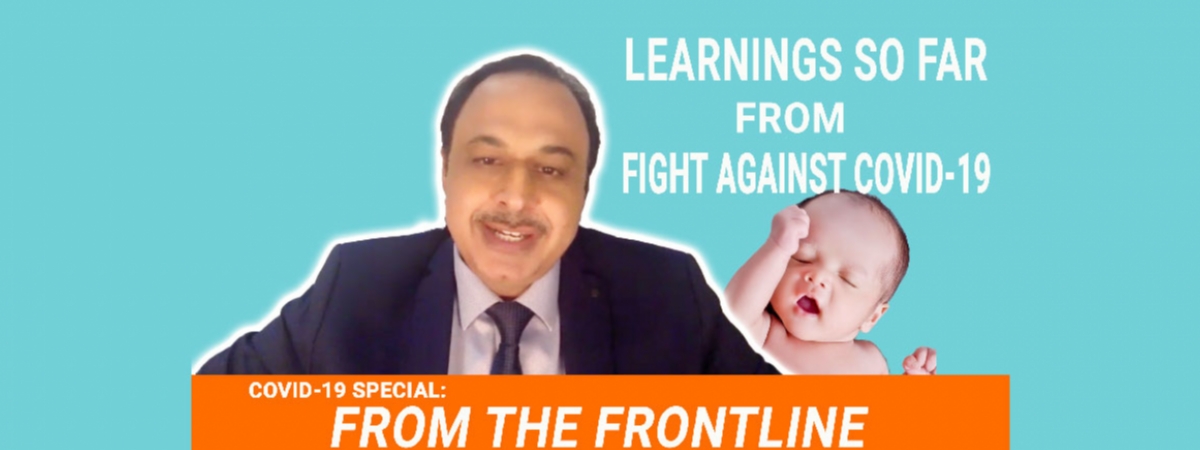
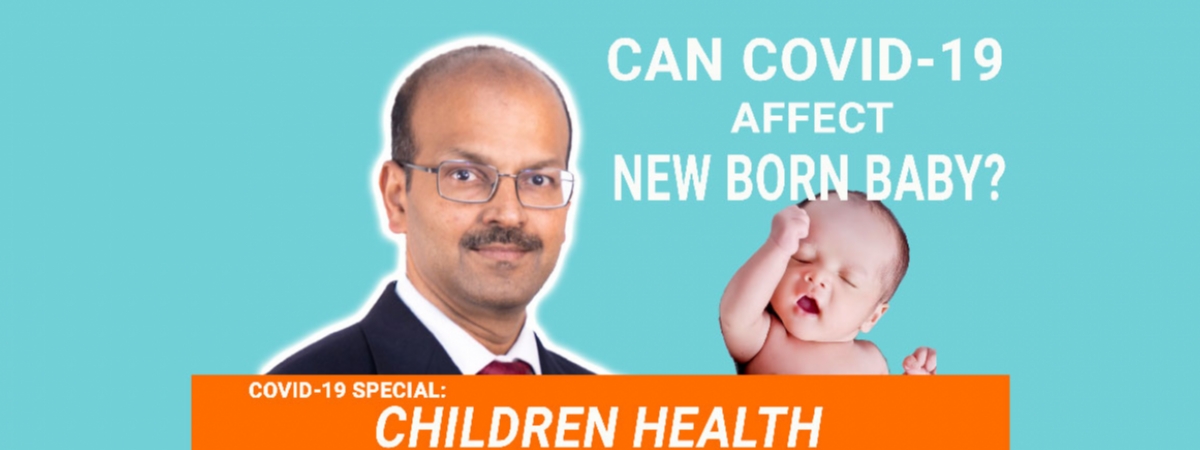
Enter your comment below
Press 'ENTER' key to submit